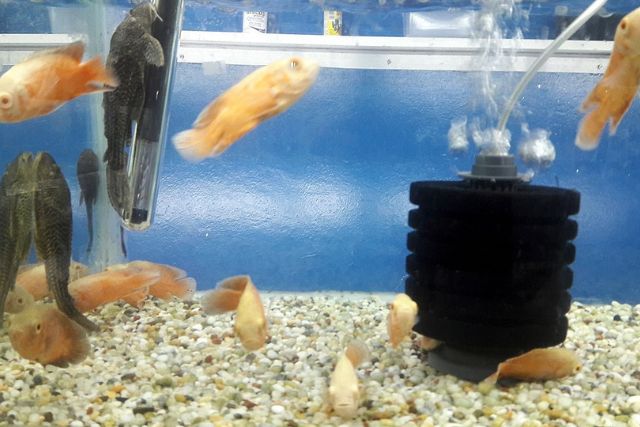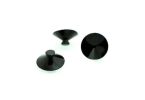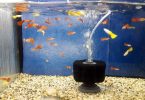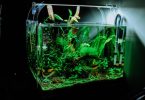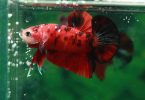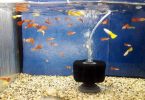Table of Contents
Using a sponge for an aquarium filter is a common and cost-effective method for aquarium enthusiasts. However, some people may wonder if a regular household sponge can be used instead of a specialized aquarium sponge.
While regular sponges may seem like a convenient option, it is important to consider the potential risks and drawbacks before using them in an aquarium.
One of the main concerns with using a regular sponge in an aquarium filter is the possibility of harmful chemicals or contaminants leaching into the water. Regular sponges are often treated with chemicals or dyes that can be toxic to fish and other aquatic life.
Additionally, regular sponges may not be able to effectively filter out debris and waste, leading to poor water quality and potential health issues for the aquarium inhabitants.
Therefore, it is important to use a sponge specifically designed for aquarium use to ensure the safety and well-being of the aquatic environment.
Why Use Aquarium Filters?
Aquarium filters are an essential component of any aquarium setup. They help to maintain a healthy environment for the fish and other aquatic creatures.
Without a filter, the water in the tank can quickly become contaminated with harmful substances such as ammonia, nitrates, and nitrites.
Over time, this can lead to the growth of harmful bacteria and algae, which can be harmful to the fish and other aquatic creatures.
There are several reasons why aquarium filters are important. First and foremost, they help to remove harmful substances from the water.
This includes fish waste, uneaten food, and other debris that can accumulate in the tank. Without a filter, these substances would build up and create a toxic environment for the fish.
Another important reason to use an aquarium filter is that it helps to maintain the pH balance of the water.
This is important because fish are sensitive to changes in pH levels. If the pH level in the water becomes too acidic or too alkaline, it can be harmful to the fish and other aquatic creatures.
In addition to removing harmful substances and maintaining the pH balance of the water, aquarium filters also help to oxygenate the water.
This is important because fish need oxygen to breathe. Without a filter, the water in the tank can become stagnant, which can lead to a lack of oxygen for the fish.
Overall, aquarium filters are an essential component of any aquarium setup. They help to maintain a healthy environment for the fish and other aquatic creatures by removing harmful substances, maintaining the pH balance of the water, and oxygenating the water.
Types of Aquarium Filters
When it comes to aquarium filtration, there are several types of filters available on the market. Each type has its own advantages and disadvantages, and choosing the right one depends on the size of the tank, the type of fish, and the budget.
In this section, we will discuss three main types of aquarium filters: sponge filters, canister filters, and hang-on-back filters.
Sponge Filters
Sponge filters are one of the most popular types of aquarium filters, especially for small tanks. They are simple, inexpensive, and easy to maintain.
Sponge filters work by pulling water through a sponge, which traps debris and bacteria. The sponge provides a surface area for beneficial bacteria to grow, which helps to keep the water clean and healthy for fish.
One of the advantages of sponge filters is that they are gentle on fish. They do not create strong currents that can stress out fish, making them ideal for breeding tanks or tanks with delicate fish.
Sponge filters are also easy to clean and maintain. They can be rinsed in tap water and reused, and the sponge can be replaced when it becomes worn out.
Canister Filters
Canister filters are another popular type of aquarium filter. They are more expensive than sponge filters, but they are also more powerful and can handle larger tanks.
Canister filters work by pulling water through a series of media, such as foam, ceramic rings, and activated carbon. The media trap debris and bacteria, and the water is then returned to the tank.
One of the advantages of canister filters is that they are very effective at removing impurities from the water. They can handle a large volume of water and can filter out even the smallest particles.
Canister filters are also very versatile. They can be customized with different types of media to meet the specific needs of the tank.
Hang-on-Back Filters
Hang-on-back filters, also known as power filters, are a popular choice for aquariums of all sizes. They are easy to install and maintain, and they are very effective at removing impurities from the water.
Hang-on-back filters work by pulling water through a cartridge that contains filter media, such as foam, carbon, and bio-rings. The media trap debris and bacteria, and the water is then returned to the tank.
One of the advantages of hang-on-back filters is that they are very easy to install and maintain. They can be hung on the back of the tank and plugged in, and they do not require any additional equipment.
Hang-on-back filters are also very effective at removing impurities from the water. They can handle a large volume of water and can filter out even the smallest particles. However, they can create strong currents that may stress out fish.
In conclusion, there are several types of aquarium filters available on the market, each with its own advantages and disadvantages. Sponge filters are simple, inexpensive, and easy to maintain, making them ideal for small tanks.
Canister filters are more expensive but are very effective at removing impurities from the water and can handle larger tanks.
Hang-on-back filters are easy to install and maintain and are very effective at removing impurities from the water, but they can create strong currents that may stress out fish.
Can I Use Regular Sponge for Aquarium Filter?
Aquarium filters are essential for keeping the water clean and clear for the fish and other aquatic animals.
One of the most common types of filters is the sponge filter. It works by drawing water through a sponge, which traps debris and other particles, thus keeping the water clean. But can you use a regular sponge for an aquarium filter?
The short answer is yes, you can use a regular sponge for an aquarium filter, but it may not be the best option. While a regular sponge can trap debris and other particles, it may not be as effective as a sponge specifically designed for aquarium filters.
Aquarium sponges are usually made of a more porous material, which allows for better water flow and more efficient filtration.
Another issue with using a regular sponge is that it may contain chemicals or other substances that can be harmful to aquatic animals. For example, some sponges may contain detergents or other cleaning agents that can be toxic to fish and other aquatic animals.
It is essential to ensure that the sponge you use for your aquarium filter is safe and free of any harmful substances.
When choosing a sponge for your aquarium filter, it is best to opt for one specifically designed for aquarium use.
These sponges are usually made of a more porous material, which allows for better water flow and more efficient filtration. They are also typically free of any harmful chemicals or substances that could harm your aquatic animals.
In conclusion, while you can use a regular sponge for an aquarium filter, it may not be the best option. It is essential to choose a sponge specifically designed for aquarium use to ensure optimal filtration and the safety of your aquatic animals.
Why You Should Not Use Regular Sponge for Aquarium Filter
Using regular household sponges as a filter in an aquarium may seem like a cost-effective solution. However, it is not a good idea due to several reasons.
Firstly, regular sponges are not designed to be used in an aquatic environment. They can quickly deteriorate and fall apart when exposed to water for an extended period.
As a result, small sponge particles can break off and clog the aquarium’s filter, leading to poor water quality and potential harm to aquatic life.
Secondly, regular sponges do not have the necessary pore sizes to effectively filter the water in an aquarium.
The sponge’s pores are too large, allowing debris and waste to pass through and accumulate in the aquarium. This can lead to a build-up of harmful toxins, which can cause illness and death to aquatic life.
Thirdly, regular sponges do not have the same level of durability as aquarium-specific sponges. They lack the strength and resilience to withstand the constant flow of water and pressure from the aquarium’s pump.
Therefore, they may break down and need to be replaced more frequently than aquarium-specific sponges, which can ultimately cost more in the long run.
In conclusion, using regular household sponges as a filter in an aquarium is not recommended. It can lead to poor water quality, harm to aquatic life, and ultimately cost more in the long run.
It is essential to invest in aquarium-specific sponges that are designed to withstand the aquatic environment and effectively filter the water.
Alternatives to Regular Sponge for Aquarium Filter
When it comes to aquarium filtration, regular sponge is a commonly used material. However, there are alternatives to regular sponge that can be just as effective or even more so. In this section, we’ll explore some of the alternatives to regular sponge for aquarium filters.
Filter Sponges
Filter sponges are a popular alternative to regular sponge. They come in a variety of shapes and sizes, and are designed specifically for aquarium filtration.
Filter sponges are made from a porous material that allows water to flow through, while trapping debris and waste. They are easy to clean and can be reused multiple times.
One advantage of using filter sponges is that they can be cut to fit any size filter. They are also available in different densities, which allows for customization of the filtration process.
For example, a finer density sponge can be used for removing smaller particles, while a coarser density sponge can be used for larger debris.
Filter Floss
Filter floss is another alternative to regular sponge. It is made from a synthetic material that is designed to trap debris and waste. Filter floss is available in different densities, which allows for customization of the filtration process.
One advantage of using filter floss is that it is very effective at removing small particles from the water. It can also be used in combination with other filtration materials, such as filter sponges or bio balls, to create a more effective filtration system.
Bio Balls
Bio balls are a popular alternative to regular sponge for biological filtration. They are made from a porous material that provides a large surface area for beneficial bacteria to grow. These bacteria help to break down waste and maintain a healthy aquarium environment.
One advantage of using bio balls is that they are very effective at biological filtration. They are also easy to clean and can be reused multiple times. However, they are not as effective at mechanical filtration as filter sponges or filter floss.
In conclusion, there are several alternatives to regular sponge for aquarium filtration. Filter sponges, filter floss, and bio balls are all effective options that can be used in combination or individually to create a customized filtration system.
It is important to choose the right materials for your aquarium based on the specific needs of your fish and plants.

